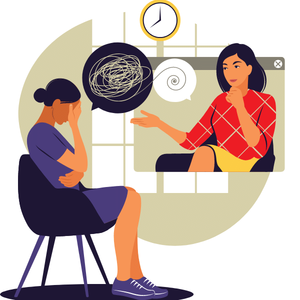The Future Of Depression And How It Is Affecting Mental Health In 2022
Body
Why are so many people suffering from depression right now?
Last year, surgeons issued a new alert highlighting the urgency of addressing the nation's youth mental health crisis, pointing to the unprecedented impact of the pandemic on the nation's youth and families' mental health, as well as long-standing mental health concerns. 2019 Coronavirus disease pandemic. As the Covid-19 pandemic continues, many people are beginning to feel the effects of heightened anxiety and depression. As a result, mental health professionals have reported an influx in patients seeking help for their psychological wellbeing.
A new HHS study published in March 2022 revealed that the number of youngsters identified with a mental illness increased dramatically over the previous four years, with the number of children treated for anxiety or depression increasing by almost 30 percent. While the frequency of mental health symptoms in the study was high, it was down from the CDC study, which found that 63 percent of young adults had depression or anxiety a year earlier in June 2020. Mental health has deteriorated sharply by 2020, with an estimated 53 million cases of major depressive disorder and 76 million cases of anxiety disorders globally, a study found. According to the World Health Organization, anxiety and depression rates worldwide increased by 25 percent within the first year of the pandemic.
How COVID-19 affected both young people and adults.
According to a World Health Organization (WHO) research, the worldwide incidence of anxiety and sadness increased by 25% in the first year of COVID-19. Mental illness and demand for mental health services are at an all-time high, particularly among children, as we approach the end of the 2-year COVID-19 epidemic in the United States. The current study seeks to establish a link between social media use and mental health-related symptoms of depression by looking at issues between COVID-19 and mental health among young people in the US. Their study looks at how the pandemic has impacted the mental health of young people in the US and how they are using social media for Social support and coping with stress.
Mental health is closely linked to physical health
Based on a comprehensive review of the available evidence on the impact of the COVID-19 pandemic on mental health and mental health services, and estimates from the latest Global Burden of Disease Study, this summary shows that mental health has been affected by the pandemic. Suicidal behaviour and risk of self-harm of young people's health. A Chinese study reports that excessive use of social media during the COVID-19 lockdown has led to unexpected mental health crises such as depression and anxiety (Zhong et al., 2021). First, young people are more likely to develop behavioural health problems (young adults between the ages of 18 and 25 have the highest prevalence of any mental illness) and are more likely to speak openly about mental health and seek help. It is critical to promote better pathways to care and make it as easy as possible for all Americans in need of behavioural health, including common and common conditions such as anxiety and depression, to access resources that can improve their well-being.
While the future of depression is unknown, you can still improve your mental health today.
Author Bio
Aheesha Chopra
Counselling Psychologist and Addiction
Aheesha is a certified Counselling Psychologist at Mantra Care who majorly deals with Depression and Anxiety. Skilled in Clinical Teaching, Online Therapy, Motivational Interviewing and Psychoeducation. Experience working with children, adolescents and adults from different cultural backgrounds. Apart from this, she is also a relationship coach who has been successfully handling relationship counselling cases with an experience of two years now.









Comments